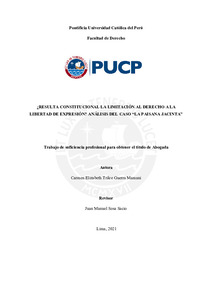El sistema se apagará debido a tareas habituales de mantenimiento. Por favor, guarde su trabajo y desconéctese.
¿Resulta constitucional la limitación al derecho a la libertad de expresión? : análisis del caso La Paisana Jacinta

View/
Date
2021-08-16Author
Guerra Mamani, Carmen Elizabeth Trilce
Metadata
Show full item recordAbstract
En este trabajo, la autora hace un análisis del caso la Paisana Jacinta, analizando los
argumentos de las partes y el razonamiento seguido por la Sala Civil de la Corte Superior de
Justicia de Cuzco. En tal sentido, se estudian los aspectos procesales y sustantivos teóricos
que involucran a este caso, entre ellos si este proceso cumple con los requisitos pertinentes
establecidos en el artículo 5° del Código Procesal Constitucional, así como los derechos que
se encuentran comprometidos y los límites que estos presentarían en el caso en concreto, a
propósito de la categoría del discurso de odio. De esta manera, se desarrolla, de forma teórica
y aplicada al caso en concreto, los derechos y principios invocados, como el derecho al honor
y buena reputación, no discriminación, dignidad y libertad de expresión.
Asimismo, se brinda una crítica al razonamiento del órgano judicial que resolvió esta causa,
teniendo en cuenta la distinción entre normas regla y normas principios para analizar la
eventual afectación al mandato de no discriminación, así como presentar ciertos reparos en
torno al análisis de proporcionalidad empleado por la Sala para resolver este caso. In this work, the author analyses the case of the “Paisana Jacinta”, with focus in the
arguments of the parties and the reasoning followed by the Civil Chamber of the Superior
Court of Justice of Cuzco. In this sense, the procedural and substantive aspects that are
involved this case are assessed, including if this constitutional process satisfies the relevant
requirements contained in the article 5° of the Procedural Constitutional Code, as well as the
rights that are compromised and the limits that these would present in the specific case. In
this way, the invoked rights and principles are developed, theoretically and applied to the
specific case, such as the right to honor and good reputation, non-discrimination, dignity and
freedom of expression.
Likewise, a critical view is offered concerning the reasoning of the judicial body that
resolved this case, taking into account the distinction between norms, which could be
classified as rules and principles in order to analyze the possible impact on the nondiscrimination
rule. Furthermore, it is presented certain objections regarding the
proportionality test used by the Chamber to resolve this case.
Temas
Derecho procesal constitucional--Perú
Discurso del odio
Libertad de expresión--Regulación
Programas de televisión--Perú
Discurso del odio
Libertad de expresión--Regulación
Programas de televisión--Perú
Para optar el título de
Abogado




